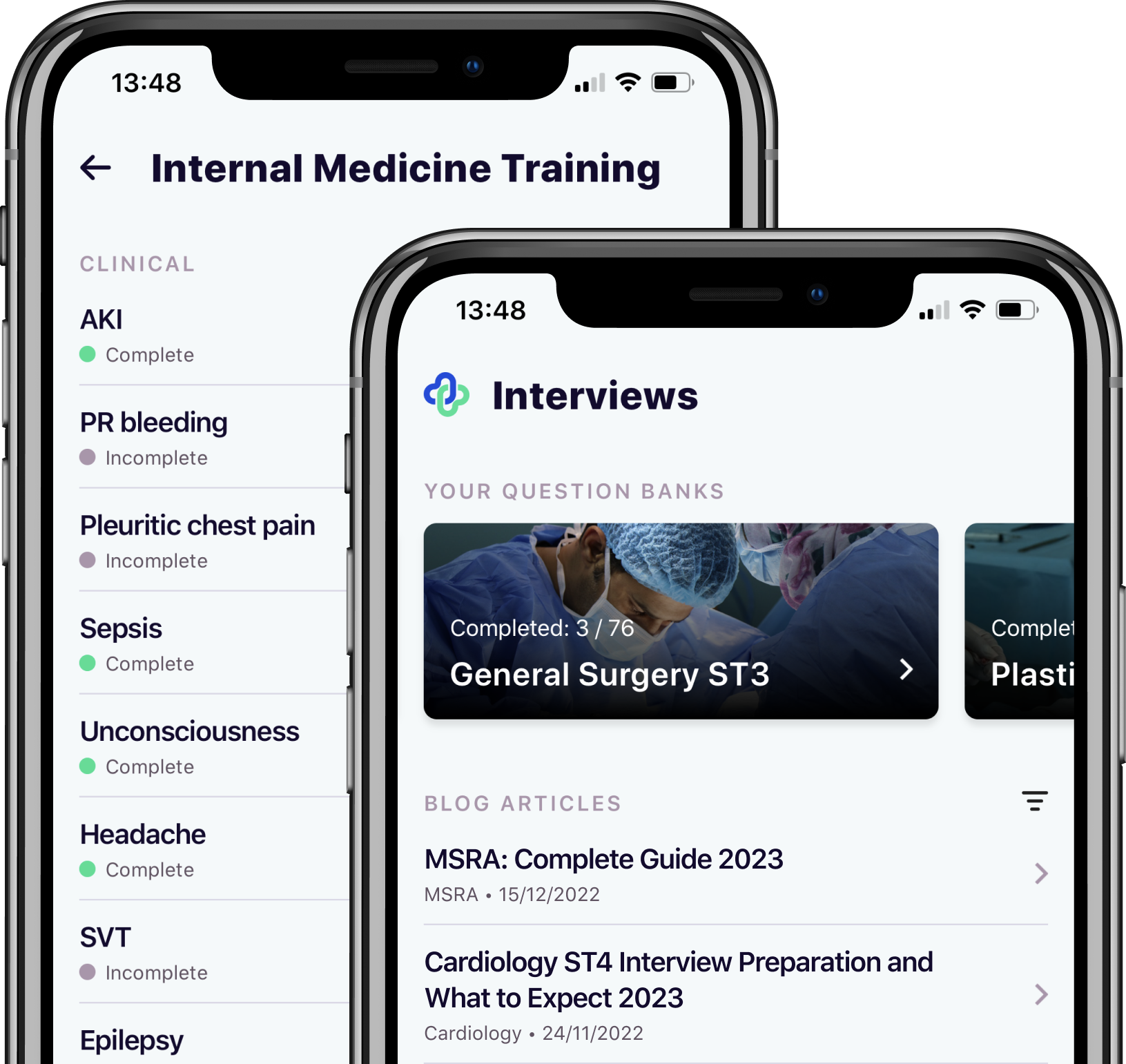
Life as a Cardiology ST4
Cardiology is one of the most competitive medical specialties, and like all higher specialty training, is often demanding. Deciding where you complete your Higher Specialty Training means first deciding whether you value having a Cardiology ST4 National Training Number (NTN) somewhere you want to live and work, or if you just want a National Training Number. NTNs in more competitive areas – generally London and the big cities – are harder to secure. You will often be up against non-training grade fellows with several years of Cardiology experience.
When it comes to preparing for your interview, don’t forget to check out our Cardiology ST4 Interview Question Bank, with example interview questions and comprehensive answers, our questions cover all aspects of the interview syllabus.
We have put together this blog, to give you an idea of what life is like for a Cardiology ST4, and if you have any questions, just get in touch!
Cardiology ST4: The Day-to-day job
Once you have your NTN, the day-to-day job will differ based on whether you are:
- In a tertiary centre (London and major cities) vs a non-tertiary centre (DGHs and other hospitals).
- In a centre that performs primary PCI 24/7/365 vs a DGH that has no out of hours Cardiology cover.
- In a centre where you undertake Medical Registrar on-calls to achieve your GIM competencies (now that all trainees have to dual accredit in GIM as well as Cardiology!) so you will split your time over the year between Medicine and Cardiology.
- In some combination of the above, where you might do Cardiology out of hours on-calls and not Medical Registrar on-calls.
There is no typical day in Cardiology, but anywhere with a coronary care unit will generally have an ST4 or other SpR assigned to help with decision-making and support, ideally for the whole Monday-Friday stretch to ensure continuity. Non-CCU Cardiology patients are also your responsibility to cover by undertaking Registrar ward rounds when rostered there.
Aside from working on CCU, the suggestion is that in any week you should have one half-day session a week in a coronary catheter lab, and one half-day session performing Echocardiography. This is as well as supporting the wards with Registrar ward rounds at least 2-3 times a week, and 1-2 outpatient clinics a week – with all the associated dictation and admin. If you are doing medical on-calls alongside this, you can imagine how difficult getting lab time, Echo and Cardiology experience becomes!
A typical week when not helping run the Coronary Care Unit might look like this:
| Monday | AM | Ward Round |
| PM | Clinic | |
| Tuesday | AM | Cath Lab session |
| PM | Referrals | |
| Wednesday | AM | Ward round |
| PM | Echo session | |
| Thursday | AM | Ward round |
| PM | Clinic | |
| Friday | AM | Referrals |
| PM | Ward cover |
What is it like being a Cardiology ST4 in the Coronary Care Unit (CCU)?
These are typically the busiest – but often most instructive – days you’ll have. In hospitals where there is a Registrar on CCU, while there will always be a Consultant who does the ward rounds (some CCUs get two ward rounds a day), you are responsible for the care of the CCU patients in between these rounds, generally with an SHO to support you.
A typical day might look like this:
| 08:00 | Multi-disciplinary meetings (MDT) – potentially 3-4 a week including Imaging, Electrophysiology, Joint Cardiothoracics and Cardiology meetings. |
| 08:30 | Consultant ward round – in-person reviews of every CCU inpatient to make a plan for the day or week ahead, trying to take into account space in the Cath Lab if patients need a procedure or device and organising inpatient investigations. |
| 10:00-12:30 | Support your SHO in completing ward round jobs, including specialty discussions, while answering your bleep, advice queries from GPs via switchboard, reviewing ECGs that other teams in the hospital are concerned about. This can be anything from AF with rapid ventricular response to acute coronary syndrome. |
| 12:30 | Lunchtime teaching – depending on where you work this may be Consultant delivered or delivered by you to the junior doctors, or delivered by them with you to support teaching and learning points.
On other days, there might be a lunchtime MDT e.g. discussing infective endocarditis in and out-patients at a weekly MDT with Microbiology and Cardiothoracic surgery. |
| 12:30-13:00 | Lunch (hopefully!) |
| 13:00-17:30 | Continue answering bleep and other queries, with a Consultant ward round around 15:00/16:00 (focussed more on addressing concerns and decision making than in-person reviews, unless patients are acutely unwell). |
| 17:30 | Home (hopefully!) |
What other responsibilities are involved for a Cardiology ST4?
In between the ward rounds and answering your bleep, you might be doing anything on the list below:
- Reviewing ECGs sent through on the primary PCI line to decide whether to activate the Cath Lab – your local hospital will have a protocol for whether you can activate the team yourself in or out of hours or if you need Consultant confirmation.
- Reviewing new Echocardiogram results to decide whether further investigations are needed, such as angiography, cardiac MRI or CT scanning – or just up-titration of or adding medications.
- Reviewing unwell patients, for example, hypotensive patients post-pPCI or unwell after a new cardiac implantable electronic device.
- Reviewing chest x-rays performed after device implantation to confirm patients can go home, and there is no pneumothorax.
- Consenting patients for coronary angiography +/- angioplasty or other procedures.
- Reviewing all of the overnight telemetry records for patients both on CCU – for example, has a recent pPCI patient had a run of VT overnight – and off CCU – for example, has a patient on the Acute Medical Unit admitted with syncope had a prolonged pause or tachy-arrhythmia on telemetry that would explain their presentation – making sure you’ve documented what you’ve seen and let the ward team know!
In many places, the CCU Registrar is the “on-call Cardiology” service in hours for the hospital. Sometimes you’ll end up being the raised Troponin interpretation service, and this is a real chance to cut your teeth on becoming more confident at both reviewing patients in person and reviewing patients and giving advice remotely. If your hospital has an electronic patient record, the latter is vastly easier as you can see ECGs, ward round entries and blood tests from afar.
In that role, you’ll be called about anything from chest pain to ECG interpretation to control of tachy- and bradyarrhythmias. Patients attending outpatient Cardiology clinics and investigations such as Echo may occasionally require admission or review, for example, for a new diagnosis of a large pericardial effusion or dangerously low ejection fraction. In between the rest of your workload, this is usually down to you!
On the other hand, if you are working on the Cardiology wards as a ward SpR, this can sometimes be an opportunity to go to the cath lab or echo after you have done your morning ward round while supporting your ward juniors – as long as they are clear on what the jobs are and have a way of getting hold of you! In some hospitals, the protocol is that a designated Registrar sees all new Cardiology referrals, for example, those from the Acute Medical Unit, and then discusses them with Consultants. In others, there is direct Consultant review often supported by a designated SpR, SHO, and often an ANP.
Outpatient clinics will again differ depending on whether you are inside a tertiary centre or outside, but unless it is a specialist clinic – for example, electrophysiology or adult congenital heart disease, this will mean seeing undifferentiated general Cardiology patients such as post-ACS follow-up, syncope, hypertension, potential heart failure and follow up of congenital and familial conditions such as hypertrophic cardiomyopathy.
Conclusion
Whatever you do as a new Cardiology ST4 in this fast-paced and rapidly developing medical specialty, remember that wherever you are working you are surrounded by not just your senior doctor colleagues, but advanced nurse practitioners, specialist nurses and experienced ward nurses who will often have spent more time working in Cardiology than you have, and in particular in your hospital, so don’t be afraid to ask for help!
Now you have decided to apply to Cardiology, check out our blog post on Interview Preparation and What to Expect. You can also check out our Cardiology ST4 Interview Question Bank, updated for 2025, it has been produced by previously high-scoring trainees who are currently in Cardiology training jobs.
This blog is written by Robert Hurwitz Bremner, a current Cardiology ST4 registrar in the Wessex Deanery, and hopefully helps to give you an insight into what to expect as a Cardiology trainee!

Take your subscriptions with you
Our mobile app allows you to access your interview and exam question banks wherever you are.



